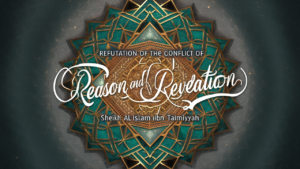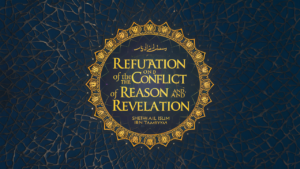Refutation of the Conflict of Reason and Revelation
Or
Reconciling Authentic Revelation with Explained Reason
Sheikh Al-Islam Ibn Taymiyyah
Part One
(Chapter 1)
Translation : Dr M A Mufazzal

When considering the statement that if there is a conflict between scriptural evidence and rational evidence, or between scripture (revelation) and reason, or between transmitted knowledge and reason, or between the apparent meanings of transmitted texts and definitive rational proofs, or any similar expressions, there are a few possibilities to consider:
- Reconciling the two, which is impossible because it would involve combining two contradictory things.
- Rejecting both, which is also problematic.
- Prioritizing scripture over reason, which is impossible because reason is the foundation of transmitted knowledge. If we prioritize scripture over reason, it would undermine reason, which is the basis of the transmitted knowledge. Undermining the foundation of something undermines the thing itself. Thus, prioritizing transmitted knowledge would undermine both transmitted knowledge and reason.
Therefore, reason must be given precedence, and then transmitted knowledge should either be interpreted or left as is. If the two are in conflict, like two opposing forces, it is impossible to combine them, but it is not impossible for both to be false.
This principle has been adopted by Al-Razi and his followers as a general rule in their interpretation of the books of Allah and the words of His prophets. They have rejected the evidence brought by the prophets and messengers regarding the attributes of Allah and other matters they conveyed, thinking that reason opposes them. Some of them also argue that scriptural evidence does not lead to certainty. We have elaborated on this claim regarding scriptural evidence elsewhere.
This principle, which they established, was preceded by some, including Abu Hamid, who used it as a rule in answering questions about difficult texts, such as the questions posed by Qadi Abu Bakr Ibn Al-Arabi. Qadi Abu Bakr disagreed with many of those responses.
Our Shaikh, Abu Hamid (al-Ghazali), used to say that he delved deeply into the philosophies and tried to extricate himself but was unable to. He reported that Abu Hamid himself admitted to being inadequate in the study of Hadith. Abu Bakr Ibn Al-Arabi established another principle based on the method of Abu Al-Ma’ali and his predecessors, like Qadi Abu Bakr Al-Baqillani.
These principles, established by these scholars, each create their own guidelines for interpreting what the prophets conveyed from Allah. They make their foundational beliefs based on what they think their intellects have discerned and make the prophetic teachings secondary to these beliefs. They accept what aligns with their principles and reject what does not.
This approach is similar to what the Christians did with their creeds, which they made the core of their faith, interpreting the texts of the Torah and the Gospel accordingly. However, their creeds were based on their understanding of the prophetic texts or what they had received about them, which led to mistakes in either comprehension or the credibility of the transmitters.
Like other errant individuals who rely on auditory evidence, their mistakes either lie in the chain of transmission (isnad) or in the content (matn) itself. However, these innovators have established their doctrines based on their own reasoning, often erring in their judgments and intellects. Christians are closer to venerating the prophets and messengers than these individuals, yet they resemble them in innovating doctrines by misinterpreting texts or affirming false narrations about the Messenger, similar to the Khawarij, Wa’idiyyah, Murji’ah, Imamiyyah, and others.
This is unlike the innovations of the Jahmites and philosophers, which are built upon principles they themselves acknowledge as contrary to the recognized teachings of the prophets. Yet, these individuals mistakenly consider their innovations to be consistent with the words of the prophets, believing them to be true
For them, there are two methods of interpreting the texts of the prophets: substitution (al-tabdeel) and obfuscation (al-tajheel).
The proponents of substitution fall into two categories: those who engage in imaginative fabrication and those who practice distortion and interpretation. The former group, the fabricators, claim that the prophets conveyed information about God, the Day of Judgment, Heaven, Hell, and even the angels, which does not correspond to the reality of these matters. Instead, they argue that the prophets spoke in a manner that allowed people to imagine and conceive of God as a great corporeal being, the resurrection of bodies, and tangible rewards and punishments, although, in actuality, these matters are not as they were described. This approach, they argue, is taken because it is in the best interest of the general populace to be addressed in a manner that they can comprehend and visualize.
They imagine that the matter is as they describe it. and even if it is a lie, it is a lie told for the benefit of the public, as their mission and the public’s interest could only be fulfilled through this method. Ibn Sina (Avicenna) and his contemporaries based their doctrines on this principle, as illustrated in his “al–Risala al–adhawiyya” (“A Treatise on Sacrifices”).

These thinkers assert that the prophets intended their words to be taken literally and wanted the public to understand these literal meanings, even though such meanings are false, contrary to reality, and against the truth. They intended to convey these false and baseless notions to the public for their own good. Some of them claim that the prophet knew the truth but presented the opposite for the public’s benefit, while others assert that the prophet did not know the truth as philosophers do. These individuals often regard a perfect philosopher as superior to a prophet and even prefer the perfect saint with this perspective over the prophet, as Ibn Arabi al-Tai claims that the Seal of the Saints is superior to the prophets.
Similarly, figures like al-Farabi and Mubashir ibn Fatik, among others, prefer the philosopher over the prophet. However, those who assert that the prophet was aware of the truth might argue that the prophet is superior to the philosopher because he knew everything the philosopher knew and more, and he could communicate with the public in ways that a philosopher could not. Avicenna and his followers hold this view. This perspective is shared by philosophers and esotericists, including the Ismaili sect, the authors of the “Epistles of the Brethren of Purity,” al-Farabi, Avicenna, Suhrawardi, Ibn Rushd (Averroes), and the heretical Sufis who diverged from the orthodox teachings of the early masters of the scripture and the Sunnah, such as Ibn Arabi, Ibn Sab’in, and Ibn Tufayl, the author of “Hayy ibn Yaqdhan,” and many others.
Some people agree with these views, claiming that the prophets’ teachings about God were meant to create imaginative impressions rather than convey the literal truth, particularly concerning descriptions of the afterlife. Others argue that this imaginative approach was only intended for certain teachings about God, such as the anthropomorphic attributes like God’s sitting and descending. This viewpoint is common among various scholars who deny the literal existence of these attributes, as seen in numerous theological discussions.
As for the proponents of distortion and interpretation, they claim that the prophets did not intend by their statements anything other than what is true in essence. They believe that the truth in essence is what they have understood with their intellects. Consequently, they strive to interpret these statements to align with their views through various kinds of interpretations. This often requires altering the language from its known methods and relying on obscure metaphors and figurative speech.
In many instances, their rational thinkers know with certainty that the prophets did not intend by their words what they have interpreted them to mean. These individuals often use interpretation as a means to counter opposing views, aiming to render the words in a manner that the speaker might possibly intend with their words, rather than seeking the true intention of the speaker and aligning the interpretation with the speaker’s context.
Any interpretation not aimed at clarifying the speaker’s intention and explaining their words in a way that reveals their true meaning is essentially false. This is why most of them do not assert their interpretations with certainty. They often say, “It is possible that this is what is meant,” and the best they have is the potential for the word to bear such an interpretation. However, in most cases, the actual intent of the specific prophet with that particular expression is understood to be quite the opposite. The context of the statement and the state of the speaker often make it clear that it is impossible for the speaker to have intended that particular meaning with that specific wording.
In summary, this approach is common among many theologians and others. It forms the basis for the schools of thought of various theologians who oppose certain scriptural texts, including the Mu’tazila, the Kullabiya, the Saalmiya, the Karramiyya, the Shi’a, and others.
We have mentioned in various places that the term “interpretation” (ta’wil) in the Qur’an can refer to the ultimate outcome of a matter, even if it aligns with the apparent meaning of the words. It can also refer to the explanation and clarification of the meaning of words, which is consistent with their apparent meaning, as used by early exegetes like Mujahid and others. Additionally, it can refer to diverting a word from its more apparent meaning to a less apparent one based on a supporting argument. This specific use of “interpretation” is primarily found in the works of some later scholars.
However, the Companions, the Followers, and all the leading scholars of Islam, including the four Imams and others, did not restrict the term “interpretation” to this specific meaning. Instead, they understood “interpretation” in the first or second sense. Consequently, when some later scholars assumed that the term “interpretation” in the Qur’an and Hadith—such as in the verse, “But no one knows its interpretation except Allah, and those firmly grounded in knowledge say, ‘We believe in it; all of it is from our Lord'” (Surah Al-Imran 3:7)—was meant in this specific technical sense, they believed that the verse should be stopped at “except Allah.”
They thought this implied that the verses and Hadiths had meanings different from their apparent meanings and that only Allah knows those meanings. They believed that neither the angel who brought down the Qur’an, Gabriel, nor Muhammad (peace be upon him) nor any other prophet knew these meanings.
Additionally, they believed that the Companions and the Followers, and those who followed them in excellence, did not know the meanings. They thought that Muhammad (peace be upon him) would recite verses such as, “The Most Merciful is established over the Throne” (Surah Ta-Ha 20:5), “To Him ascend good words” (Surah Fatir 35:10), and “Rather, both His hands are extended” (Surah Al-Ma’idah 5:64), among other verses describing attributes. Furthermore, they claimed that when he said, “Our Lord descends every night to the lowest heaven” and similar statements, he did not know their meanings. According to them, only Allah knows the real meanings of these statements.
They presumed that this was the approach of the early generations (the Salaf). These people, whom we can call the proponents of obfuscation and ignorance, effectively claim that the prophets and their followers were ignorant and misguided, as they did not understand what Allah meant by His descriptions of Himself in the verses and the statements of the prophets.
Among these individuals, some claim that the intended meanings of these texts are contrary to their apparent and understood meanings, and that none of the prophets, angels, Companions, or scholars know what Allah intended by these texts, just as they do not know the timing of the Hour. Others say that the texts should be understood according to their apparent meanings but maintain that only Allah knows their true interpretation. This leads to a contradiction, as they assert that these texts have an interpretation that contradicts their apparent meanings while also claiming that they should be taken at face value.
This contradiction was noted by Ibn Aqil in his critique of his teacher, Judge Abu Ya’la, in his book on the condemnation of interpretation. These groups share the belief that the Prophet did not clarify the intended meanings of the texts they consider problematic or ambiguous. This is why each group identifies different texts as problematic. For example, those who deny the descriptive attributes (sifat khabariyya) and claim that these attributes cannot be understood through reason, consider the texts describing them as problematic and ambiguous. Conversely, the attributes they consider to be known through reason are deemed clear and unequivocal. Similarly, those who deny the concept of elevation (‘ulu) and vision (ru’yah) find the texts related to these topics problematic.
(In essence, these differing approaches among scholars regarding scriptural interpretation reflect their varying assumptions about the clarity and comprehensibility of the texts, leading to distinct understandings of what constitutes ambiguous or clear verses.)
Those who deny the attributes altogether consider the texts affirming these attributes as problematic, unlike those affirming the beautiful names of God. Similarly, those who deny the meanings of the names find the related texts problematic. Those who deny bodily resurrection and the descriptions of paradise and hell also find those texts problematic. Likewise, those who deny predestination consider the texts affirming that God is the creator of all things and that whatever He wills happens as problematic, but not the verses concerning commands, prohibitions, promises, and warnings. On the other hand, those who delve into predestination with the notion of compulsion find the texts concerning warnings, commands, and prohibitions problematic.
Thus, each group finds problematic what the other does not. They then claim that the meanings of these problematic texts were not clarified by the Prophet. Among them, some say the meanings were not known at all, while others assert that the meanings were known but not explained and were instead referred to rational evidence and to those who strive to interpret those texts.

They all agree that the Prophet did not know or did not make known the meanings, leading to ignorance or to the community not understanding them, though without intending to endorse compound ignorance. However, others argue that the Prophet intended to teach compound ignorance and false beliefs, and these are famously known among the community as heretics and atheists. Unlike the former group, who assert that the Prophet did not intend to make anyone ignorant or to endorse false beliefs, but their statements imply that the Prophet did not clarify the truth in the verses and hadiths he addressed to the community, either because he did not know it or because he knew it but did not explain it.
Therefore, Imam Ahmad said in his sermon, which he composed in response to the heretics and Jahmiyyah regarding their doubts about the ambiguous verses of the Qur’an and their incorrect interpretations:
“Praise be to Allah, who, in every era after the prophets, leaves remnants of the people of knowledge who call those who have gone astray back to guidance and endure harm from them. They revive the dead with the Book of Allah and enlighten the blind with the light of Allah. How many of Iblis’s victims have they brought back to life, and how many wandering, lost souls have they guided! How good their effect is on people, and how bad people’s effect is on them. They protect the Book of Allah from the distortions of the extremists, the false claims of the liars, and the misinterpretations of the ignorant. These are the people who raise the banners of innovation and unleash the reins of discord. They disagree with the Book, oppose the Book, and agree on forsaking the Book. They speak about Allah and His Book without knowledge. They talk about the ambiguous matters and deceive the ignorant masses with their ambiguities. We seek refuge with Allah from the trials of the misguiding ones.”
A similar sermon is attributed to Umar ibn al-Khattab, may Allah be pleased with him, as mentioned by Muhammad ibn Wadih in his book “Al-Hawadith wal-Bida‘.” In this discourse, it is described that despite their differences concerning the Book, they all oppose it and are united in abandoning it. They speak with ambiguous words and deceive the ignorant masses by mixing truth with falsehood. The crux of the matter is that there are two types of evidence: religious and rational.
Those who claim to know the divine through their intellects, among the philosophers and theologians, assert that the prophets did not know the truth that they have come to know or that the prophets knew it but did not convey it to the people as clearly as they did, and instead spoke in contradiction without clarification.
Those who claim to follow the Sunnah and the Sharia and to adhere to the Salaf, yet are ignorant of the meanings of the texts of the prophets, say that the prophets and their followers did not know the meanings of these texts which they conveyed from Allah. Alternatively, they claim that the prophets knew the meanings but did not explain their intended meanings to the people. These groups might assert that they know the truth through their intellects and then strive to interpret the words of the prophets in a way that aligns with rationality.
The objective of removing these problematic ambiguities is to make people strive to understand the truth through their intellects and then interpret the words of the prophets, who did not clarify their intended meanings. They might say that they know the truth through their intellects and that these texts were not understood by the prophets, similar to how they did not know the timing of the Hour but were commanded to recite them without pondering or understanding their meanings.
Alternatively, they might claim that these matters cannot be known by reason or transmitted knowledge and that we are prohibited from understanding rational or transmitted knowledge. They argue that the prophets and their followers neither knew rational matters nor understood the transmitted knowledge.

Pingback: Dots and Lines: The Spiritual Essence and Modern Transformation of Islamic Calligraphy -
great translation of such a typical text deeply rooted in philosophy and scholastic theology, plz keep up the good work.
Pingback: Integrating Virtue and Governance: Shah Wali Allah’s Model of Human Felicity and Socio-Economic Development in Hujjat Allah al-Baligha -
You absolutely know how to keep your readers interest with your witty thoughts on that topic. I was looking for additional resources, and I am glad I came across your site. Feel free to check my website Article Star about Blogging.
Hey, if you are looking for more resources, check out my website Article Sphere as I cover topics about SEO. By the way, you have impressive design and layout, plus interesting content, you deserve a high five!
I came across your site wanting to learn more and you did not disappoint. Keep up the terrific work, and just so you know, I have bookmarked your page to stay in the loop of your future posts. Here is mine at UY6 about Airport Transfer. Have a wonderful day!
Great!!! Thank you for sharing this details. If you need some information about Airport Transfer than have a look here YH6
This was a very good post. Check out my web page QH3 for additional views concerning about Thai-Massage.
You absolutely know how to keep your readers interest with your witty thoughts on that topic. I was looking for additional resources, and I am glad I came across your site. Feel free to check my website QU5 about Airport Transfer.
Impressive posts! My blog 57N about Thai-Massage also has a lot of exclusive content I created myself, I am sure you won’t leave empty-handed if you drop by my page.
Superb layout and design, but most of all, concise and helpful information. Great job, site admin. Take a look at my website UQ6 for some cool facts about Cosmetic Treatment.
You made some really good points on your post. Definitely worth bookmarking for revisiting. Also, visit my website 59N for content about Cosmetics.
This is top-notch! I wonder how much effort and time you have spent to come up with these informative posts. Should you be interested in generating more ideas about Airport Transfer, take a look at my website YW9
Great post! I learned something new and interesting, which I also happen to cover on my blog. It would be great to get some feedback from those who share the same interest about Car Purchase, here is my website QH6 Thank you!
What fabulous ideas you have concerning this subject! By the way, check out my website at FQ5 for content about Adsense.
An excellent read that will keep readers – particularly me – coming back for more! Also, I’d genuinely appreciate if you check my website UQ5 about Thai-Massage. Thank you and best of luck!
Impressive posts! My blog QH8 about Cosmetics also has a lot of exclusive content I created myself, I am sure you won’t leave empty-handed if you drop by my page.
With your post, your readers, particularly those beginners who are trying to explore this field won’t leave your page empty-handed. Here is mine at YR4 I am sure you’ll gain some useful information about Thai-Massage too.